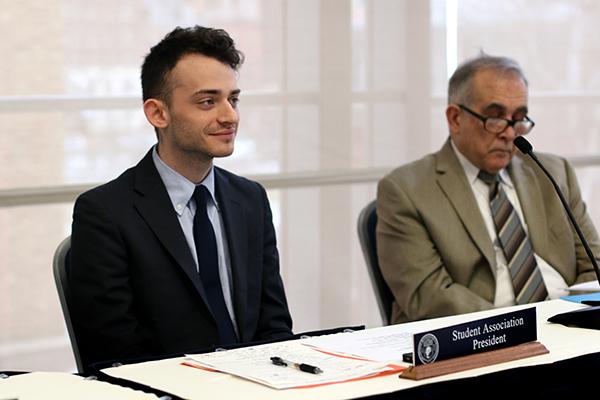Just one student attended a sexual violence information session during Colonial Inauguration last summer, Student Association President Nick Gumas told University officials during his speech at Friday’s Board of Trustees meeting.
He said that fact supports the call to require incoming students to receive training in how to handle situations involving sexual violence and how to intervene as a bystander. Top GW leaders have since voiced support for investigating the issue on campus.
“For many incoming students, understandably college is the first time that they hear about sexual assault and sexual violence, and we want to make sure again everyone’s prepared on day one,” Gumas said.
Gumas pointed to several “high-profile” incidents of sexual abuse on campus last semester, including a sexual assault reported at the Phi Sigma Kappa townhouse, and said trainings should focus on the “red zone” – the first few weeks of classes – when sexual assault is most likely to occur.
“The first six weeks on a college campus are a potentially dangerous time for the issue of sexual assault, and we just want to make sure people are as prepared as possible,” Gumas said.
University President Steven Knapp said in an interview that he understood Gumas’ “articulate case” to hold sexual violence trainings at CI because it’s one of a handful of times when all freshmen are in the same place.
“The biggest challenge is communication because as [Gumas] said, once students come here, it’s hard to get any particular education initiative to go to students,” Knapp said. “If we use it at Colonial Inauguration, that’s the one time you have a captive audience of everybody all together.”
Knapp said he’d be open to discussions with student leaders about training sessions. He pointed to past student lobbying efforts, like those to move Student Health Service and the University Counseling Center to campus, as examples of when administrators have responded to student concerns.
“I don’t personally run CI, so I think we have a lot [of people] to talk to who are responsible for developing that,” Knapp said. “I don’t like to pose things on people without discussion, but I think what he’s bringing forward is a very interesting idea we need to explore.”
The push for mandatory CI training follows the recent release of GW’s sexual violence survey results, in which 20 percent of female freshmen students said they felt unsafe on campus at night. The survey also found that about a quarter of undergraduate students experience unwanted sexual behavior while at GW, and the majority of students don’t know how to contact the Title IX office.
Title IX Coordinator Rory Muhammad has called for more trainings for all students after the results were released.
Board of Trustees Chair Nelson Carbonell said in an interview that officials must look at more ways to address sexual violence on campus. He added that the Board is “very focused” on the issue.
“We really need to figure this out, and I’m not sure we have it figured out yet,” Carbonell said.
CI has offered optional training sessions and presented issues related to sexual violence during skits in past years. In the skits, orientation leaders have acted out situations incoming students may encounter at GW, such as a roommate saying he or she has experienced sexual violence.
“The skits CI performs are a good way to prime, but they are by no means sufficient to educate on severity and complexity,” Gumas said.
Georgetown, Cornell and New York universities have started mandatory training for freshmen within the past year. Georgetown holds peer-led sessions, but Gumas said GW would not have enough trained student leaders to work with the large number of incoming freshmen at CI. Cornell and New York universities both require students to complete online programs during their first two semesters on campus.
Dean of Student Affairs Peter Konwerski said trainings would be more successful if the sessions were offered in different formats – including online modules, “virtual exercises” and small-group discussions during orientation. He said the safety and security information session that the University Police Department leads during CI is “is not the only place [the training] should be.”
Even if GW begins mandatory trainings, officials “are never going to hit every student,” Konwerski said.
He said the University’s Title IX office would coordinate the training sessions and an assistant Title IX coordinator, who has yet to be hired, will lead them.
“CI is an important mechanism,” Konwerski said. “We have to hit all different types of groups.”
Colleen Murphy and Mary Ellen McIntire contributed reporting.








